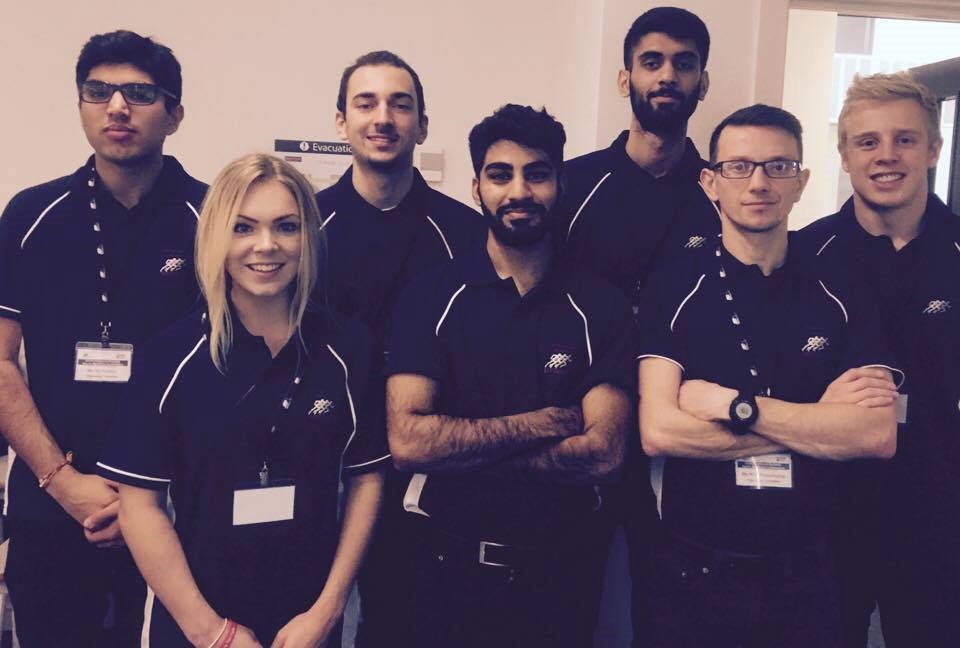Undergraduate perspective on Sport & Exercise Medicine – a BJSM blog series
By Tej Pandya

The 2016 USEMS Student sports medicine conference was held in Manchester on Saturday 12th November. One hundred and fifty keen students attended from all across the UK -representing many different professions. It was fantastic to see such a high level of interest in sports medicine from undergraduates. Below are three of the biggest conference themes, highlights, & further resources on these key topics – enjoy! ….
Over training syndrome – a condition that we all need to think about
Dr Leon Creaney (@AthleticsDrLeonA) kick started the day with a brilliant talk explaining the concept of over-training in elite athletes. He explained how we can spot over training syndrome (also known as unexplained underperformance syndrome) – having the same training load but recurrent decrease in performance. Causes of this include: rapid increasing in training volume, lack of recovery and training greater than 10% of the day (2.4 hours) in a 24-hour period.1 Careful monitoring is essential to prevent over training. With no specific treatment other than prolonged rest and graduated return to exercise, this can be a frustrating time for both the athlete and the medical team.
Event medical cover is a great way to gain experience in SEM
Dr Clint Gomes (@drclintgomes) fantastically explained what is involved in providing event medical cover at major cycling championship events.2 Getting skilled up- either as a medical student with organisations such as St John Ambulance or as a doctor on courses such as AREA/SCRUMCAPS is key to making yourself flexible. He also gave these tips for success: knowing the sport and type of injuries you may encounter, recognizing and working within the limits of your competence, and not being in “spectator mode” during the event. If working for a smaller club, selecting your own medical kit and asking the club to reimburse your costs will help you to be fully prepared on match days. Finally, after the event, reflect on what went well and what could be better, so that you be even better next time! To hear more about this, listen to the brilliant BJSM podcast by Prav Mathema.
Motivational interviewing can be useful technique for behavior change
The brilliant Dr Amal Hassan (@oh_amalhassan) spoke in the afternoon about how we can motivate our patients to be more physically active. The vicious cycle of: presenting to the doctor, inadequate exercise advice, increasing pain and symptoms leading to the belief that “exercise will make it worse” and then returning to the doctor is a key example of where motivational interviewing can be used to change attitudes. Where possible, using the patients own language, clarifying understanding and asking open questions can help build the collaborative relationship- remember change is not short term!
Be wary of “Female Athlete Triad” in your female athletes
Dr Isobel Heyworth (@IsobelHeyworth) spoke passionately about the importance of recognizing chronically low energy availability, menstrual dysfunction and low bone mineral density in female athletes – commonly referred to as “The Female Athlete Triad.” 2 Often these symptoms can be difficult to measure in an amateur setting- make sure to ask the difficult questions! Recovery of energy status may well be days or weeks but it can take years to recover bone mineral density so it is important to emphasize this to your patient.
Huge thanks to all organizers, attendees, and presenters!
Thanks to all the fantastic speakers who gave up their time on a Saturday to come to rainy Manchester! Also, thanks to all the sponsors, including our platinum sponsor BASEM, to help keep the costs down and support undergraduate education.
References
- Seene T, Kaasik P, Alev K, Pehme A, Riso EM. Composition and turnover of contractile proteins in volume-overtrained skeletal muscle. International journal of sports medicine. 2004 Aug;25(06):438-45.
- De Souza MJ, Nattiv A, Joy E, Misra M, Williams NI, Mallinson RJ, Gibbs JC, Olmsted M, Goolsby M, Matheson G, Barrack M. 2014 Female Athlete Triad Coalition Consensus Statement on treatment and return to play of the female athlete triad: 1st International Conference held in San Francisco, California, May 2012 and 2nd International Conference held in Indianapolis, Indiana, May 2013. British Journal of Sports Medicine. 2014 Feb 1;48(4):289-.
Tej Pandya is an intercalating medical student at the University of Manchester and currently President of the Manchester Sports and Exercise Medicine Society (@semsocuk). All enquiries can be directed to semsocuk@gmail.com
Manroy Sahni (@manroysahni) coordinates the BJSM Undergraduate Perspective blog series. He also serves as Education Officer for the Undergraduate Sports and Exercise Medicine Society (USEMS) committee.
Please send your blog feedback and ideas to: manroysahni@gmail.com